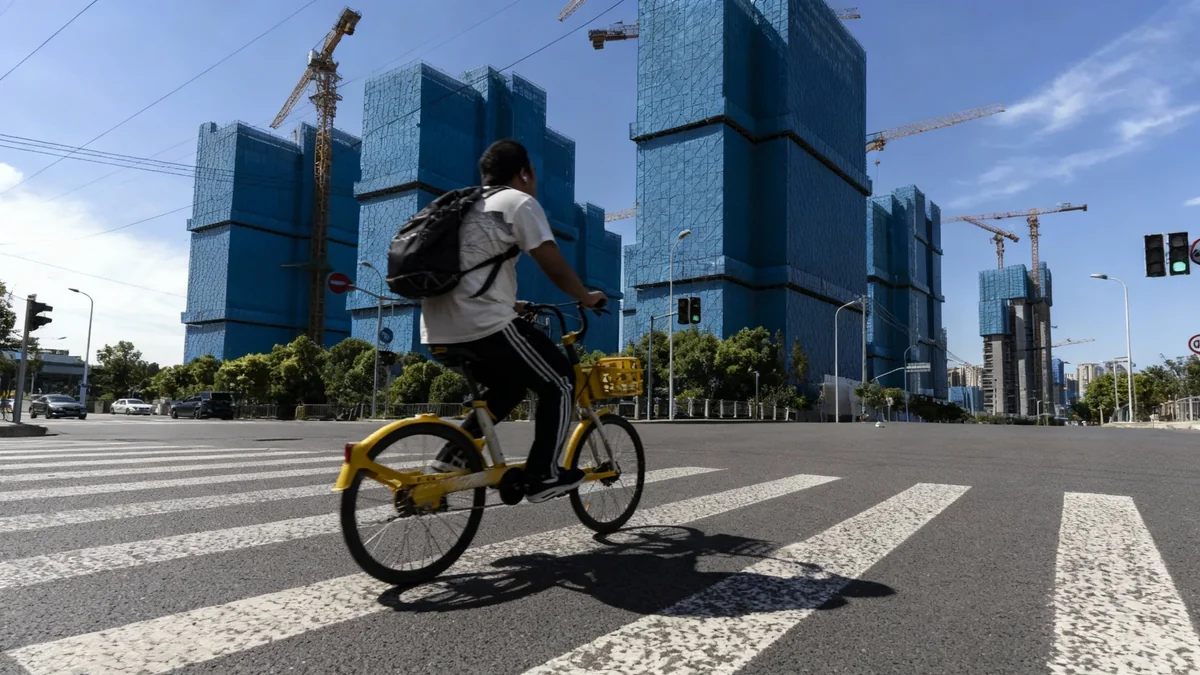For decades, China's economic ascent was built on a foundation of concrete and steel. The nation's real estate sector became more than just a place for people to live; it transformed into the primary store of wealth for millions of households and a powerful engine for economic growth. Now, policymakers in Beijing are navigating a precarious situation: attempting to slowly deflate what many analysts call the largest real estate bubble in history without triggering a catastrophic collapse that could ripple through the global economy.
Key Takeaways
- China's real estate sector has been a dominant force in its economic growth, representing a significant portion of its GDP.
- For many Chinese households, property is the most significant asset and primary form of savings, creating a unique economic sensitivity.
- The government faces the challenge of making housing more affordable while preventing a market crash that would erase household wealth.
- The current slowdown is a result of deliberate policy measures aimed at reducing leverage and speculation in the property market.
The Dual Role of Property in China
In many economies, real estate is a significant investment. In China, however, its importance is magnified. For a generation of citizens, investing in property was seen as one of the safest and most reliable paths to prosperity. This belief fueled a construction boom of unprecedented scale, reshaping the skylines of cities across the country.
This boom, however, created a fundamental tension. As property values soared, real estate became a national piggybank, underpinning the financial security of the middle class. At the same time, sky-high prices pushed the dream of homeownership out of reach for many young people, creating a growing affordability crisis.
"You have to understand that land and property in China are not just assets; they are central to the social and economic fabric," explains one market analyst. "It's a store of wealth, a retirement plan, and a status symbol all rolled into one. This makes any policy adjustment incredibly complex."
A Unique System of Land Ownership
Unlike in many Western countries, all land in China is owned by the state. Developers purchase long-term leases, typically for 70 years for residential use. This system has given local governments a powerful revenue stream through land sales, further incentivizing the property boom for decades.
The Government's Delicate Balancing Act
Recognizing the growing risks, Chinese authorities have spent years implementing policies to cool the overheated market. The goal has been to engineer a controlled demolition rather than allowing an uncontrolled explosion. Measures have included restrictions on how much property developers can borrow and limits on the number of homes individuals can purchase.
These policies are designed to let the air out of the bubble slowly. The challenge is immense: if prices fall too quickly, the wealth of millions of homeowners could be wiped out, potentially leading to social unrest and a severe economic contraction. If they don't act, the bubble could continue to grow, making an eventual crash even more devastating.
Real Estate's Economic Footprint
At its peak, estimates suggest that the real estate sector and related industries accounted for as much as 25-30% of China's GDP. This highlights the systemic risk the property market poses to the nation's overall economic stability.
The current slowdown, marked by struggling developers and falling sales, is a direct consequence of this tightening. It represents a deliberate, albeit painful, shift in economic strategy away from debt-fueled property development toward more sustainable drivers of growth.
A Global Anomaly: Land as the Ultimate Asset
The situation in China is a modern example of a historical phenomenon explored by economists like Mike Bird, author of The Land Trap. His work examines how land, as a finite and essential asset, behaves differently from any other commodity or investment. It is both a basic human need and a vehicle for immense speculation.
In his analysis, Bird notes the inherent conflict that arises when a society's primary source of wealth is tied to the cost of a basic necessity like shelter. This paradox is at the heart of China's current dilemma.
"Land is a weird asset. We need it to be affordable because everyone needs somewhere to live. But for many people, real estate is also their biggest store of wealth," Bird has stated, encapsulating the core of the issue.
This dynamic explains why simply allowing the market to correct itself is not a viable option for Beijing. The social and economic consequences would be too severe. Instead, the government is attempting to manage a gradual cooldown, a process fraught with risk and uncertainty.
What Comes Next for China's Economy?
The era of hyper-growth fueled by real estate in China appears to be over. The government is now trying to pivot the economy toward high-tech manufacturing, green energy, and domestic consumption. This transition is proving to be difficult, as the property sector's slowdown is weighing heavily on consumer confidence and related industries like construction and home furnishings.
The key questions now are:
- Can the government successfully manage a soft landing for the property market?
- Will other sectors of the economy grow quickly enough to compensate for the real estate slowdown?
- How will the shift impact the wealth and savings of ordinary Chinese citizens?
The world is watching closely. As the second-largest economy, a significant downturn in China would have far-reaching implications for global supply chains, commodity prices, and international financial markets. The fate of the world's biggest property bubble is more than just a domestic issue; it's a matter of global economic concern.





